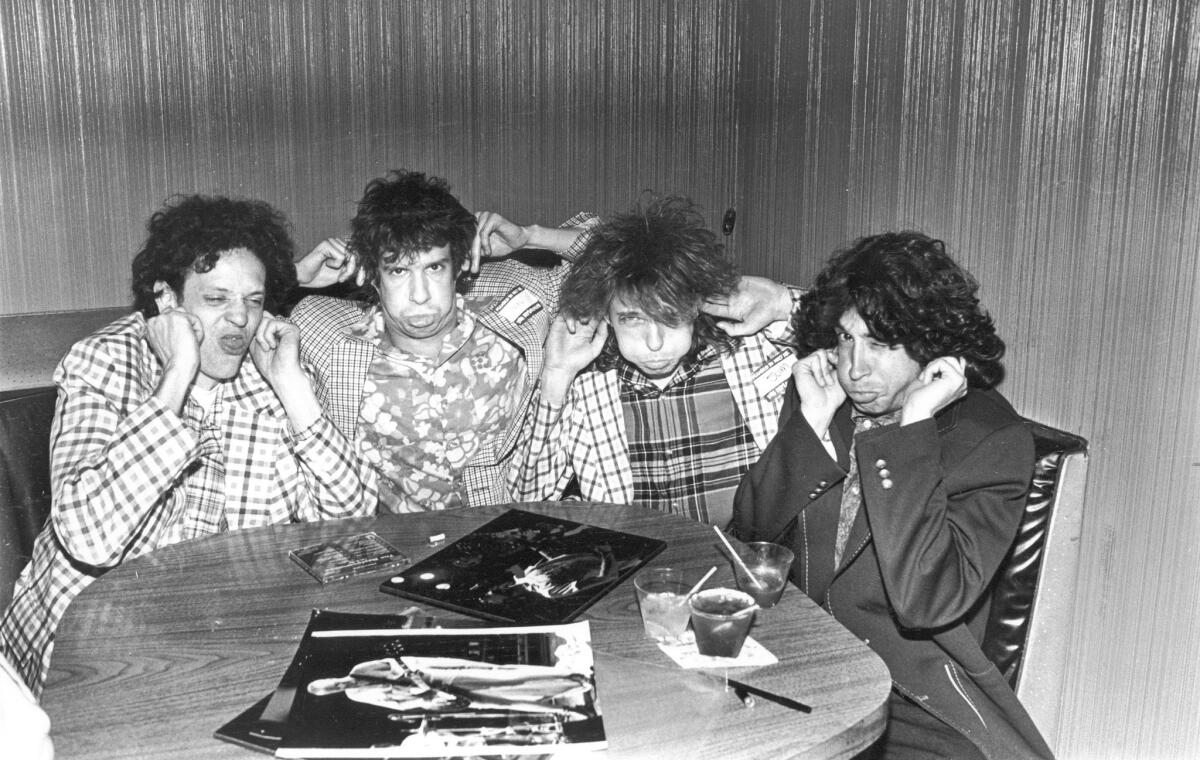Review: The Replacements’ story is told bottle by bottle, song by song, in the new book ‘Trouble Boys’

- Share via
Before the Replacements made what is perhaps their most famous and most shambolic public appearance, on “Saturday Night Live,” the A&R people at Warner Bros. were after them to shoot a video. It was the golden age of MTV, circa Madonna’s “Like a Virgin.” The noisy and chaotic Minneapolis four-piece was not impressed.
“Tell you what,” singer Paul Westerberg said. “You get us on ‘Hee-Haw’ and I’ll lip-synch to ‘Waitress in the Sky.’”
This is all recounted in “Trouble Boys: The True Story of the Replacements,” the first authorized biography of the band, though it occurs midway through the book; author Bob Mehr does not choose as its point of entry the night in 1986 when all four stumbling drunk Replacements took the stage at 30 Rock and proceeded to willfully sabotage “Bastards of Young” and “Kiss Me on the Bus,” slipping booze to host Harry Dean Stanton prior, weaving out of the cameras’ preblocked shots, swapping outfits between songs, playing out of tune and off time, shouting an F-bomb into the mike on live TV, infuriating Lorne Michaels, who afterward banned them from his show (Westerberg would return solo years later).
In its own self-destructive way, it was a brilliant anti-performance, as bewildering as anything Andy Kaufman ever did on the show. This was the Replacements at the peak of their powers, rebelliously thwarting expectations, simultaneously satirizing the ironic over-seriousness of “SNL” and mocking the second-rate-ness of their own name. They were filling a last-minute cancellation by the Pointer Sisters; for their national television debut, Mehr points out, the Replacements were actual replacements.
That summer, the band returned to New York, playing two sold-out nights at the Ritz, perhaps the biggest concerts of the group’s career. The second night ended with Westerberg in the ER with a broken finger (the casualty of a combat boot stomp from the mosh pit after he flailed a stage dive). That was classic unhinged Replacements too, marking some of their last shows with guitarist Bob Stinson, fired later that year by the rest of the band: Westerberg, drummer Chris Mars and Stinson’s own little brother, Tommy, whom he’d taught to play bass.
“Trouble Boys” opens with the 1995 funeral of Bob, who died at age 35 of organ failure, the cumulative effect of his addictions. It’s a heavy reunion scene for the ‘Mats, and going there first makes for a somber and loaded beginning — an authorial choice that roots their story in tragedy rather than in the raw, weird and dark joy of their music. Chances are anyone committing to a 520-page book already knows the songs, but you’ll have to wait some chapters before the volume turns up.
What follows is more traditional, billed as the “definitive” biography of the Replacements, the result of 10 years of meticulous research and interviews with more than 200 people within and surrounding the band. Mehr traces the band members’ disparate, uneasy origins — Westerberg is the son of a boozing Cadillac salesman; Mars’ older brother had schizophrenia; Anita Stinson took her sons away from their alcoholic, abusive father but admits she was “half in the bag” for much of Bob and Tommy’s upbringing.
Bottle by bottle, song by song, starting in the Stinsons’ Minneapolis basement, “Trouble Boys” documents the making of the records, the fights, the firings, the breakups, the rivalries (their Twin Cities counterpart Hüsker Dü, the music media’s constant comparisons to R.E.M.), the bail, the girlfriends, the wives, the kids, the sobering up and the drinking again. There are the Dickies work pants and the scruffy, uncool haircuts and then later, the makeup and the dresses and the clown costume. There’s the beer swilled out of a boot, and Jack Daniels drunk from saucers on the floor. There’s the Sire Records food fight in their plaid thrift store suits with Seymour Stein in his Playboy bunny tie. There’s a Winona cameo (Ryder and Westerberg rumors surfaced when she was dating Johnny Depp; “Everyone thinks we had this thing. Why didn’t we just have it?” Paul said); a cryptic exchange with Minneapolis royalty (Westerberg met Prince at a urinal); a deadpan encounter with Bob Dylan. When the Replacements go into the studio with a mostly sobered-up Alex Chilton (formerly of Big Star) as their producer, he instructs them as to when they’re allowed to start doing cocaine.
It all makes for compelling fodder for superfans and the gearheads and record geeks and gossips, the collective readership of any music bio. But in the tougher scenes — right after Bob’s funeral come allegations by Anita Stinson that, as a child, Bob was sexually abused by a boyfriend of hers — the author seems at a loss. The narrative hiccups here, internalizes the shock and moves on, unable to fully register the emotional impact.
That’s what “Trouble Boys” is missing most. It’s the Replacements, after all. I want the actual telling of the story to be bigger, freer, riskier; the prose to be as shambolic as the band’s most awful, room-clearing shows and also its most spectacular performances; I want the sentences to swing open, the words to be as soaked in cigarettes and beer as the trashed Econoline tour van the ‘Mats moshed in as it sped down the road to the next gig. That despite all this they could also write a hell of a love song. “It was that combination of naivete and deception — as Nabokov might have said — that made the band so compelling,” Mehr writes of the band’s early stages. Nabokov writing about the Replacements — if only!
But the author catches himself. “That was part of the attraction; watching them, you couldn’t help but root for the band.” And despite the rough edges, and perhaps because of them, I can’t help but root for this book too. By process of accumulated detail, “Trouble Boys” aims for the heart of the Replacements’ self-fulfilling self-destruction, what turned them into hometown antiheroes. It’s what R.E.M.’s Peter Buck — a comrade of the ‘Mats who played on “I Will Dare” — called their “Midwestern fatalism,” the thing that prevented them from becoming bigger than they did.
Substitute the name of your own town for the first part of that phrase, and you’ll understand exactly why you became a fan. It’s why I did, anyway, though I came long after them and far from Minneapolis. That sense of geographic futility, the small town, the midsize city. That no matter how big you make it, you’ll never really make it out. “We’re getting nowhere as fast as we can” goes the chorus of “Treatment Bound.” There’s always a limit, there’s always a ceiling, and the Replacements, gloriously, always managed to find a way to tear it down.
Bengal writes short stories and nonfiction; recent and forthcoming work appears in Pitchfork Review, Guernica and on Vogue.com.
::
Trouble Boys
The True Story of the Replacements
Bob Mehr
DaCapo Press: 520 pp., $25.99
More to Read
Sign up for our Book Club newsletter
Get the latest news, events and more from the Los Angeles Times Book Club, and help us get L.A. reading and talking.
You may occasionally receive promotional content from the Los Angeles Times.








